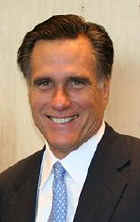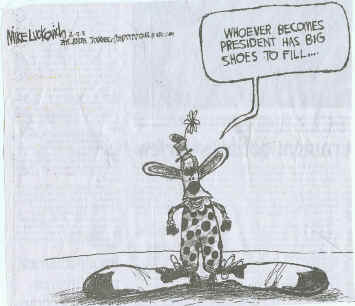Editor’s Note: I often wonder how we manage to elect anyone truly competent to the office of president, when the criteria for doing so involves so much pure nonsense. (I suppose the answer is right there in the question.) The media discusses issues that don’t matter, the candidates are obsessed with “gotchas” (like Hillary’s surrogates’ attacks on Obama’s “plagiarism”) and the American people are just too wrapped up in trivialities to differentiate what’s important from what isn’t. Well, this time around, if you can’t beat ’em, join ’em!
Can’t We All Just Get Along?
|
|
Few events provide Americans with as much hot air to argue about as a presidential election. The continuous blitz of debates, primaries and talking heads has already served up endless analyses of John Edwards’ haircuts, Rudy’s family values, John McCain’s looming senility, Barack’s sinister-sounding middle name, whether Mitt believes Jesus and Satan are brothers, and who’s Reaganesque and who isn’t. It’s a great steaming pile of sometimes slanderous — but, mostly, just plain dopey — fun. |
|
So, it’s time we cleared the decks for this year’s silliness by putting aside some of the issues that, by now, should be, as the Supreme Court puts it, “stare decisis”: something already settled. In 2008, we’ll want to focus like a laser on the truly fatuous nonsense that makes American elections so entertaining, so how about a New Year’s moratorium on some of the hackneyed noise we normally quarrel over?
For example, the First Amendment’s more than 200 years old, so you’d think no one would still be advocating censorship. But, in Manchester, Connecticut, another school board is fighting over whether the “n-word” is reason enough to ban “Huckleberry Finn.” Ernest Hemingway said, “All modern American literature comes from one book by Mark Twain called ‘Huckleberry Finn’” — and the novel is one of strongest rebuttals of racism ever written — but the politically correct still find some words unacceptable, regardless of their context or intent.
From “Ulysses” and “On the Origin of Species” to “The Catcher in the Rye,” Americans have traditionally rejected the notion that freedom of speech demands the freedom to voice unpopular ideas. St. Louis University head basketball coach, Rick Majerus, recently answered a reporter’s question on abortion by opining, “I’m pro-choice, personally.” In response, the Bishop of St. Louis asserted, “When you take a position in a Catholic university … you can’t make statements that call into question the identity and mission of the Catholic church.”
Abortion will, of course, be hotly debated during the general election, as well it should be. I, for one, enjoy the mental contortions that conservatives put themselves through pretending they want government out of our business, while insisting government needs to be in charge of America’s wombs. However, the national dialogue won’t be helped by the urge to punish or suppress unpopular opinions on the issue, especially at our universities.
This tendency dominates “The O’Reilly Factor,” which excoriates organizations such as the ACLU as “un-American” for defending controversial positions and providing a counterweight to The Factor’s own right-wing agenda. Can we at least agree on the obvious fact that majority positions and the civil liberties of the powerful don’t need all that much protection?
If so, maybe we can beat the Christmas rush by starting now to ignore the so-called “liberals’ war on Christmas.” Bill O’Reilly flogs this fiction every autumn, even though nearly all Americans are Christians, we celebrate the yuletide season incessantly from June to January, and the only people who think this “war” actually exists are far-right loonies like O’Reilly obsessed with censoring the frighteningly offensive phrase “happy holidays.”
|
|
While we’re at it, maybe we could also take a break from the evolution-vs.-creation discussion, which has been stare decisis for 100 years. Creationism hasn’t been taken seriously in places like MIT, Princeton or Oxford since the 19th century, and the Pope even endorsed evolution in 1996. So can we Americans stop embarrassing ourselves in front of the rest of the world with this dubious debate? Only in Islamic fundamentalist nations and the former Confederacy — the spiritual Arabia of the Western hemisphere — would voters applaud three 21st century presidential candidates for proudly proclaiming that they don’t believe in evolution. |
Even Southern Baptists now grudgingly acknowledge heliocentrism. So there’s hope evangelicals may someday accept modern biology and the Big Bang, although it probably won’t happen until Dick Cheney concedes the 9/11 conspiracy wasn’t hatched by Saddam. But that’s no reason the rest of us rational citizens have to go on arguing such things.
And can we stop fighting about the existence of God? Despite the series of best-selling books published by militant atheists during the past couple years, God seems unconcerned whether we believe in him or not, or he’d have made his presence more obvious. With no proof or even a shred of evidence (on either side) — and no resolution after thousands of years of debate — it’s clear this is an argument that won’t be settled in 2008. So why don’t we give it a rest?
| In the upcoming year, what do you say we limit ourselves to the election-related nonsense: Huckabee’s homophobia, Hillary’s cackle, whether Barack is black enough (or too black), and whether McCain is far enough to the right to satisfy Rush Limbaugh and Ann Coulter. We can get always back to re-arguing the other stuff in 2009. |
|
Click here to return to the Mark Drought home page.



